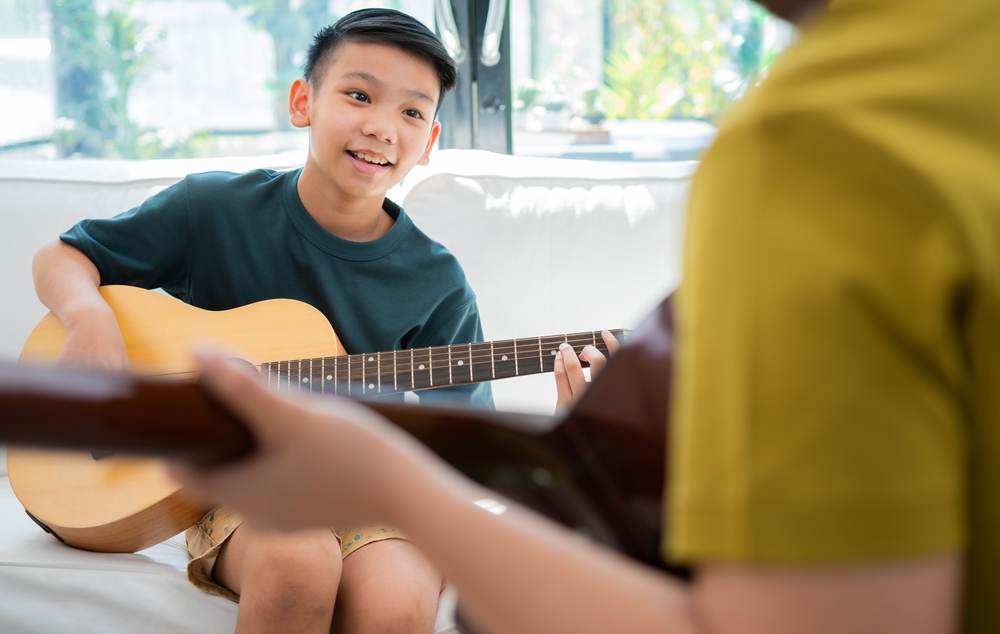
How Do You Encourage Kids To Stick With Music Lessons?
If your child is taking music lessons, you’ve likely had a conversation (or ten) about their importance. You’ve probably told your child about all the benefits of taking lessons and how the things they learn will reach far beyond their musical instrument and even their childhood.
But there may come a time when your young musician is unsure if they want to continue on with lessons. If you’ve heavily invested time, effort, and finances into your child’s lessons, or if you’re particularly passionate about music yourself, this situation can be difficult to navigate.
One of the best ways to keep your child interested in music lessons is to ensure they are engaged and feel positive about them. While the lesson itself is important, fostering a positive relationship between the music teacher, student, family, and community is also vital.
Reasons Why Kids Quit Music Lessons
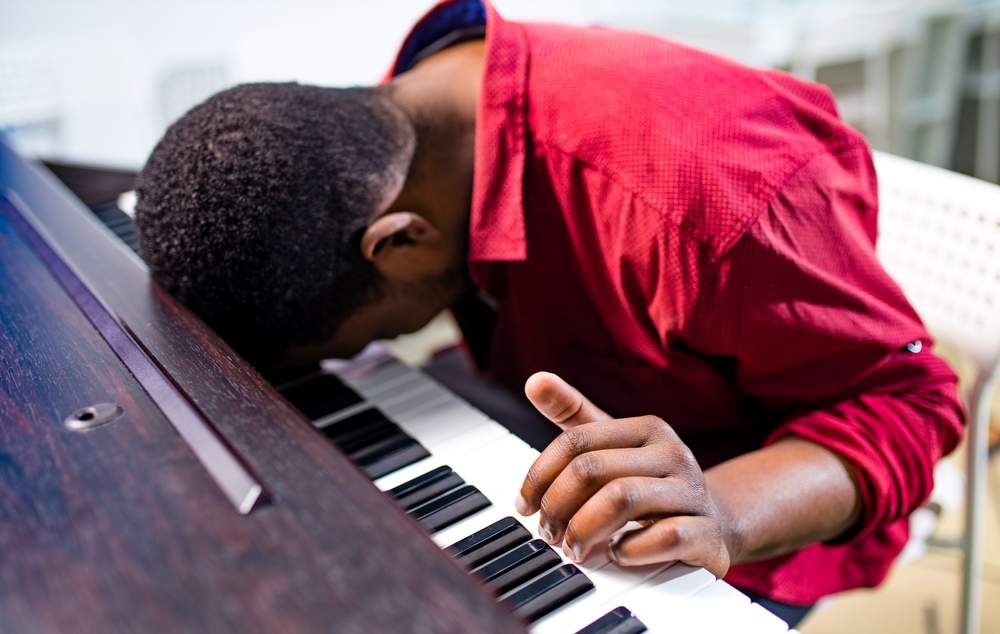
If your child has mentioned wanting to quit music lessons, you might feel blindsided and overwhelmed. Even if you saw it coming, you may still be upset about it. We can help you! It’s important to understand the reasons why kids quit music lessons, but it’s also essential that you know how to help them move past the issue and continue in their lessons with confidence and excitement.
Why Do Kids Quit Music Lessons?
Not Having a Great Teacher
Sometimes a student and teacher don’t mesh well. Teaching is as much of a talent as playing an instrument, and if your child doesn’t have the right teacher, they can lose their passion and excitement quickly. Finding a great teacher with Lessons in Your Home can ensure this isn’t an issue.
Struggling with Practicing
Practice can be an area of contention, but some planning and accountability can help alleviate practice stress. Students need to have a scheduled practice time and parents need to help them stick to it. Younger students especially cannot always motivate or discipline themselves to practice, so accountability is very important.
Misunderstanding the Ups and Downs
As with anything new, learning an instrument will have ups and downs. Enthusiasm will shift, challenges will happen, and slumps will take place. Students should be prepared for this and be aware of it so that they can push through the downs when they come rather than be sidelined by them.
The Novelty Wears Off
The anticipation of something can often be more exciting than the thing itself. If the novelty of music lessons wears off before the student gets a chance to learn fun songs and make serious progress, they will often wish to quit early on.
Ways To Encourage Children To Continue With Music Lessons
Children of all ages will need to be encouraged at some point during their journey of learning a musical instrument. While some of these tips on how to encourage them will be for one-off situations, others will require consistency from the beginning. In fact, if you can stick to some of these practices right when your child begins lessons, you may not ever get to a point where they want to quit. Regardless of how long your child has been playing an instrument and how they feel about continuing, here are some great ways to encourage children to continue on with their music lessons:
- Be the number one fan of your child’s music
- Create a practice space in your home
- Set a practical practice routine
- Provide a good quality instrument
- Know when to be more involved or when to step back in your child’s music lessons
- Let kids play the music they are interested in
- Have a talk with the music teacher
- Introduce your child to different kinds of music
- Create a positive experience in musical learning
- Make music lessons fun
Be The Number One Fan Of Your Child’s Music
It’s no secret that children often follow the lead of their parents. This is true whether you’re sharing your love of a particular food, striving to have a positive attitude in every situation, or getting excited about a sports team. Children learn by example and they notice how their parents respond to things.
Music is no different. If you’re excited about your child playing an instrument and you share with people how well they’re doing, they will be more excited about it too. They will want to make you proud and live up to your enthusiasm, so they will be more committed to practicing and doing their best. They will also acquire more confidence from you speaking highly of them, which can go a long way in both music and life.
Parents can help their children stay committed to their music lessons and their instrument by encouraging them to play for others to show how much they’ve learned, and they can even request private concerts so kids can feel special and excited about their progress, even if a big audience isn’t involved.
Additionally, parents should aim to be supportive in any way they can. This may look different for different families, and might mean purchasing a new instrument, buying a book of sheet music that appeals to the child, having them teach you how to play something on their instrument, or simply valuing your child’s appreciation for music.
It is also extremely important to emphasize and praise your child’s effort more than their actual abilities. Yes, it’s great to tell a child they did a fantastic job mastering a particular song, but be sure to call attention to how hard they’re working as well. Praise how they aren’t giving up and emphasize that you can see their growth in important life skills through their musical experience.
Create A Suitable Music Practice Space For Your Child
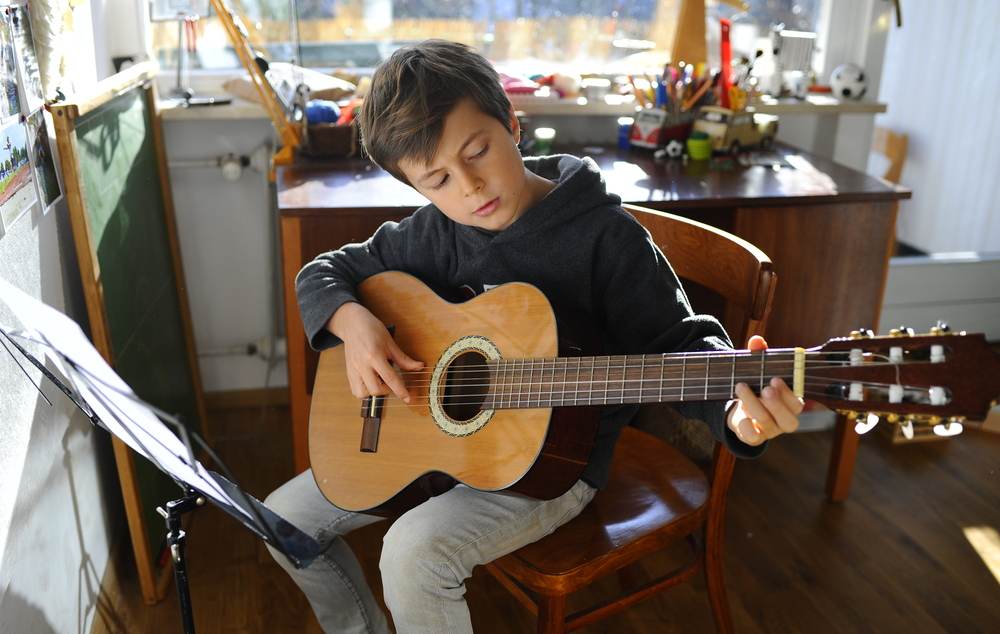
One of the biggest struggles of keeping up with music lessons is practicing. If a child doesn’t feel like they’re making progress in lessons or if they feel unprepared before a music class, they won’t feel as confident and won’t be as likely to stick with it. But as the parent, you can help by creating a suitable music practice space for your child.
Depending on what instrument your child plays, this practice space may look a little different. For example, if your child plays piano, their practice space will always be wherever the piano is in the home. If it’s in a common area, you may need to commit to clearing that area of other family members or potential distractions for a set period of time each day. This will allow your child to have optimal concentration to ensure each practice session is as successful as possible.
If your child plays a smaller instrument, he or she might be able to practice in his or her bedroom, a playroom, or another area that is away from other family members. It’s important, however, to ensure that this practice space is free from other distractions, such as technology, toys, siblings, and so on. If the instrument is exceptionally loud, such as a drum set, you may wish to find a quieter area or a soundproofed space so that your child is free to practice anytime without disturbing the rest of the household.
Also, keep in mind that depending on your child’s age, you may need to be in the room during their practice sessions. They may not need actual guidance or direction, but they may need you to encourage them along the way, set short-term goals for them, or help them stay on task.
One great way to optimize the space is to include a practice log. This can be as simple as a chart with boxes for each day of the week, in which your child can place a star, a sticker, a check mark, or the number of minutes practiced to go along with the corresponding day. This can help them manage their time better and visually see how consistent they’ve been at practicing daily.
Set A Doable Practice Routine
Some kids start playing an instrument and dive headfirst into practicing daily. Others struggle to keep up with practicing only once or twice a week. Neither is wrong, so figure out what works best for your child, your schedule, and your child’s musical goals.
In general, a good goal is to practice for 100 minutes a week. This may not be feasible for everyone, and it can be broken up into different sessions as needed. Some people do great with 30-35 minutes of practice three times a week. Others prefer practicing for 25 minutes four days a week, while others prefer to do 15-20 minutes every single day of the week.
What’s most important is consistency and being realistic. If you ask your child to practice daily for 30 minutes, but they also play sports, have homework, and have other extracurricular activities, they’ll be set up to fail from the beginning. At the same time, daily practice might not be reasonable, as some days may be packed full of sports practices, family visits, church get-togethers, and more.
Set up a practice routine and schedule, and help your child stick to it. This might mean a practice log where they check off days they practiced, putting a sticker on a chart, or simply writing down the number of minutes they practice on a given day. Set your expectations from the beginning and let your child know the schedule, but be willing to adjust it as needed if you find it isn’t working for your family.
Why Providing A Child With Good Quality Instrument Is Important
The instrument itself is an important part of your child’s enjoyment and success when it comes to music lessons. While they don’t need the most expensive, top-of-the-line instrument available, they do need a quality instrument that will serve its purpose in helping your child fall in love with playing it.
An older instrument can work well provided that it has been well cared for. But if it is dented, damaged, gets stuck, or doesn’t work properly, it’s likely to be more of a hindrance than anything else. You’ll need to take into consideration a few different factors when deciding between buying or renting a new or used instrument.
Purchasing a brand new instrument outright can be extremely expensive, and that may not seem like a worthwhile investment when you’re not even positive your child is going to stick with music lessons for a while. But other options can be more cost-efficient and still ensure your child has a high-quality instrument.
You might consider renting an instrument. Sometimes schools will offer instruments on loan to their music students, and many music stores offer instrument rentals.
You can also look into buying a used instrument. Again, pay attention to the instrument’s quality and ensure it’s not going to cause unnecessary frustration for your child. If you’re buying a used instrument, you will ideally purchase it from a reputable company or store that will back up your purchase. This means they may cover important repairs within a given period of time after the purchase date.
Know When To Be More Involved Or When To Step Back In Your Child’s Music Lessons
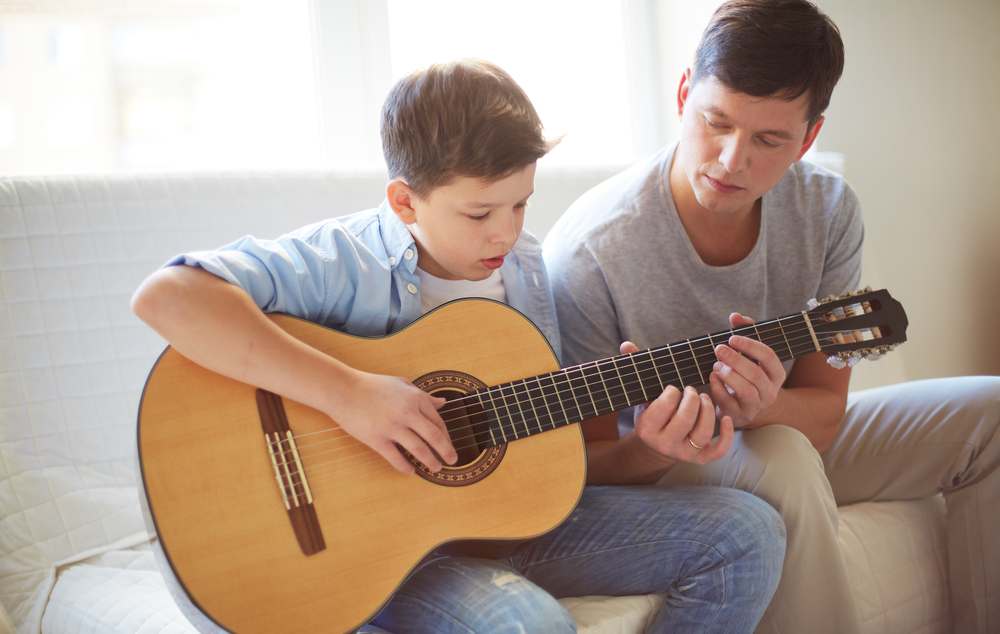
As our children get older, the hope is that we, as parents, can slowly give them more responsibility and independence. But that process is not always linear, and sometimes we have to step back in and get more involved than we were previously. If your child is struggling with music lessons or making comments about quitting, you might need to take a more proactive approach in your encouragement and help them better prepare for lessons.
Younger children may need you to sit with them during lessons so you know what they’re learning, as well as sit with them at home during practice times to reinforce what their music teacher said. You may also need to write out a practice schedule, write down goals for practicing, and set a timer to ensure they stay on task with hitting their daily practice amounts.
Older kids may need some of the same things when they’re discouraged, even if you’ve never done those things before. If they are opposed to you sitting in on lessons or buddying up while they’re practicing at home, you can talk to their music teacher about how you can better support them. Maybe it means having a mini concert to show off what they’ve been working on, getting a new piece of fun music to work on, or holding them accountable for hitting their practice goals.
On the other hand, sometimes parental involvement can be too much for some kids, and the best approach to encourage them is actually to back off. As parents, we love our kids dearly, and sometimes that love can feel suffocating. Perhaps we love music and are too invested in our child’s musical journey to where they don’t feel like it’s their thing but rather yours. Sometimes taking a more passive approach and being available on an as-needed basis is simply best. Let them practice in their own space and don’t hover or try to teach them, but instead ask how it went, encourage them in practice, and move on.
Kids need different levels of involvement from parents based on their ages, personalities, and phases of learning. Do your best to gauge what your child needs from you and encourage them in that particular way, even if it feels strange to you or isn’t what you really want to do. It might just be the difference in them continuing on a lifelong journey of music education.
Let The Kids Play The Music They Are Interested In
Letting kids play the music they want to play is huge, and it often gets understated. As a parent, you likely envision your child playing certain songs, genres, or styles of music. There may be a time and a place for that, but when they are first learning or if they’re struggling to stay motivated in their playing, it’s extremely important that they play what they enjoy.
Having something exciting to play can put a new spark in your child that makes them want to practice. It can help them focus on achieving something they care about and can bring a new level of motivation because they want to perform the piece for family and friends.
It’s important that your child gets to play songs they like early on in their music lessons, as it gives them varying levels of success and excitement that can help carry them on to the next skill or level of playing. This should continue as they become more skilled as it’s a surefire way to keep them excited and motivated.
All this being said, there is something powerful and significant about playing different genres of music as you’re first learning. Many people find that they love varying styles of music that they maybe didn’t have much experience with before, all because they learned how to play a song or two in that style early on.
Have A Talk With The Music Teacher
If your child is in a slump with their music lessons, it’s always wise to talk to their music teacher. As the parent, you are your child’s primary advocate and you play an important role in their musical journey. It can be hugely beneficial to both get insight into your child’s lessons and offer some information to the teacher that can help him or her adjust as needed to improve your child’s experience.
You can first ask if the child has mentioned a disinterest in music lessons or if their attitude has seemed to change from the start of lessons up until that point. If the child doesn’t seem any different during lessons and has only mentioned it at home, it may just be a fleeting feeling that will eventually pass. If the teacher expresses similar concerns about the child’s interest level, you may need to dive deeper into how to encourage the lessons to continue.
You can ask the music teacher about how you can help at home. Maybe you need to change up your child’s practice space, practice schedule, or how you approach playing the instrument outside of lessons. Your teacher may be able to give you warm-ups, exercises, or other approaches to help your child’s practice time be more enjoyable and productive for them. Remember that sometimes kids say they want to quit music lessons because their practice isn’t effective and they don’t feel like they’re learning, so they are stressed about going to lessons. A quality music teacher can often give you some tools to work through that.
You can also discuss your concerns with your child’s music instructor to see if they can adjust anything within the lessons that might help. Perhaps the child feels like their progress is too slow or that they’re moving too fast. Maybe they’ve expressed that lessons are stressful and frustrating, or that they seem too easy or silly. Letting the teacher know these things can help a great deal, as they can adjust their lessons accordingly to improve your child’s experience.
Introduce Your Child To Different Kinds Of Music

Let’s say your child is learning to play the guitar. They envision playing rock music with insane amps and a ridiculous drummer backing them up. But if they are playing an acoustic guitar and learning mostly kids’ songs, they may want to stop taking lessons and move on to another activity.
Allow your child to be exposed to different types of music and encourage them to get inspired by what they hear. We’re not saying that introducing new music styles will fix everything, but it can make a huge difference in keeping your child excited about learning an instrument.
Take them to live performances, including rock bands, orchestras, marching bands, jazz bands, classical instrumentalists, and more. Find some local venues with open mic nights and let your kids see and hear some different genres and instruments, or take them to a nearby festival with musical performers. You may be able to find musicians who play styles from all over the world, which can reignite their passion for learning and get them interested in a new style of music they have never considered previously.
Create A Positive Experience In Musical Learning
At its core, music is fun. Learning music should be enjoyable and a wonderful growth experience. Kids and adults of all ages are capable of learning to play an instrument, and the level of success is most linked to the level of positivity around the experience.
As a parent, you have the bulk of the responsibility when it comes to fostering that positive environment. Your child’s music teacher spends maybe an hour or two per week with your child. Your role in scheduling practices and holding your child accountable for their effort is far more significant of a time period and will have a much greater impact on your child’s experience than their music teacher will over the long term.
So how do you create that positive experience in your child’s musical journey?
Be a Cheerleader
Your child already has a music teacher, and regardless of your level of music experience, your child does not need you to be their teacher. They need you to be their encourager, their support system, and their cheerleader. They need you to tell them they’re doing great, their music sounds great, and you love to hear them practice and play. They need you to speak highly of their growth to other people and cheer for them whenever you have the opportunity.
Praise the Effort
Celebrating a fantastic performance or a flawless practice session is great. But you don’t want your child’s confidence wrapped up entirely in doing well. It’s far more important that they try their best and persist when things are hard. So praise their effort every chance you get. Talk about how they have such great perseverance and how you can see that they are working so hard. Tell them you know they’re going to figure out the difficult sections of a song because they’ve done hard things before. Remind them that the success comes from the journey and the progress rather than the perfect performance at the end.
Promote Performances
When your child has an opportunity to perform, no matter how big or small, share it with people your child knows! Invite family members, friends, teachers, coaches, and more. Get your child excited about sharing what they’ve been working so hard toward, and keep the focus on positivity and energy that is motivating your child.
Make Music Lessons Enjoyable!
While you may have dreams of your child becoming the next Beethoven, music, at its heart, is meant to be fun. It’s a new place to explore learning and personal growth, and it should be enjoyed by everyone involved. Truly, the main point of music lessons is to make learning fun for the students. This isn’t exceptionally difficult in most cases, as children tend to naturally enjoy music. But it is important that you recognize if your child gets to a point where it isn’t fun anymore, and it’s your job as a parent to advocate for your child to bring the lessons and the learning back to a place of fun discovery. Here are some ways you can help your child have fun learning to play an instrument.
Keep Practices Short and Sweet
Younger kids, in particular, don’t have exceptionally long attention spans, especially when they’re learning something new. Keep practice times short by focusing on one main goal during each practice session and recognize when your child’s focus is tapped out.
Ensure They Like Their Music
If your child isn’t playing music they enjoy, they are more likely to get burned out or lose interest. Ask their music teacher for specific songs or genres, and aim to help them get excited about playing music that speaks to them.
Play Games
There are countless musical games you can play with your child to keep learning fun. Have your child teach you a small part on the piano so you can play a duet or sing and have them practice matching your pitch with their instrument. Do a quick google search to find some fun musical games that might help your child get excited about learning again.
When Should I Stop My Kid’s Music Lessons?
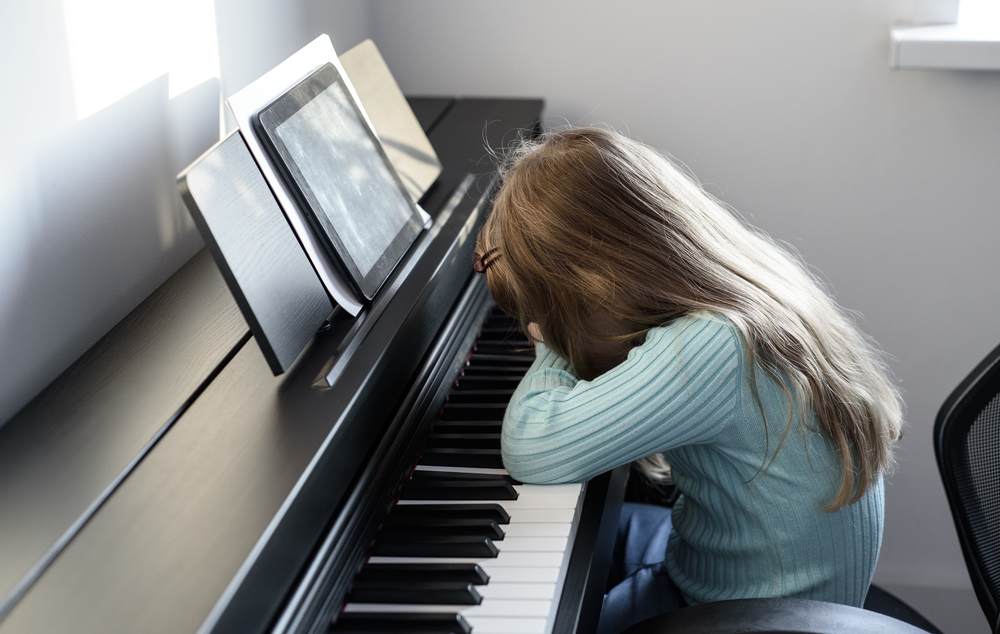
If your child has announced that they want to quit music lessons (or anything else, for that matter), you may feel overwhelmed about the decision-making process. Should you let them quit? What if they regret it? On the other hand, what if you don’t let them quit and they end up resenting you for it?
Your child is likely facing a tough decision when it comes to continuing with music lessons or not. But as the parent, you’re the one who will allow or not allow a particular decision to be made, so you’re likely feeling just as stressed out about the choice.
As with anything, it’s best to have an honest conversation with your child about their reasons for wanting to quit. You can work through the pros and cons together and discuss any options that your child may have moving forward.
We’ve compiled two lists here. One is when quitting is simply not an option (barring extreme circumstances, of course). The second list is when quitting may be the best choice, given that you’ve had thorough discussions with your child.
When Quitting Isn’t an Option
- In the middle of a season or semester – If your child committed to a year of piano lessons or signed up to play trumpet in the school band, they owe it to themselves, their teachers, their peers, and you to finish out that session.
- When it gets harder – Working hard at something can feel overwhelming, and if the demands increase at a particular time, your child may want to quit. They should stick it out and keep trying their best to prove to themselves that they can do hard things and to practice resilience and perseverance.
When Quitting May Be Best
- When safety is a concern – While physical safety may not be a huge issue when it comes to playing an instrument, mental safety is important. If your child is burned out or overwhelmed to the point of anxiety or depression, it may be time to take a look at their schedule and remove some activities.
- When the joy is lost – This one can be tricky because sometimes things getting harder can make an instrument feel less joyful and fun. But if you, your child, and the music teacher have tried to address this issue and your child is still miserable every time he picks up his instrument, it might be time to seriously consider moving on from music lessons.
- When other things take priority – A lot of activities that our kids do are only for a certain part of their lives, and that’s okay. Perhaps they loved playing the flute but know they aren’t going to continue in college and they instead want to take on an internship during high school. It’s okay to allow other important things to take priority in a child’s life and move on from a previous activity, provided that you’ve discussed it with your child and both feel it is in their best interest.
When Music Lessons Take A Physical Or Mental Toll
If your child’s physical or mental health is at stake and music lessons are contributing to that negatively, it’s time for a serious conversation about stepping back or discontinuing lessons.
In most cases, physical health won’t be at risk due to playing an instrument, unless your child is dealing with a sickness or injury that impedes their ability to hold or play their instrument. But if your child has mentioned a concern about their physical health as it relates to playing music, you need to listen. The goal of music lessons is to have fun and grow personally, not to barely survive with your head above water.
As it pertains to mental health, you need to be attentive to whatever your child is sharing with you. In many cases, mental health is often improved when a child plays an instrument, but sometimes the stress of the lessons can be too much. If your child already has a lot of activities and has a lot on their plate, music lessons just might be the straw that breaks the camel’s back.
Some children struggle with perfectionism and they feel the need to excel at everything they do. For these kids, music can sometimes be another obstacle to overcome in their strive for perfectionism, and this can contribute to poor mental health. Music should be fun, not stressful, so if taking lessons is only adding stress to your child’s life, it might be time to reconsider.
Nothing is worth sacrificing your child’s mental health, physical health, or overall safety for. If your child has expressed concerns about their health in any capacity, particularly as it relates to music lessons, you need to listen up and have an honest conversation.
When Children Don’t Find Joy In Music Lessons
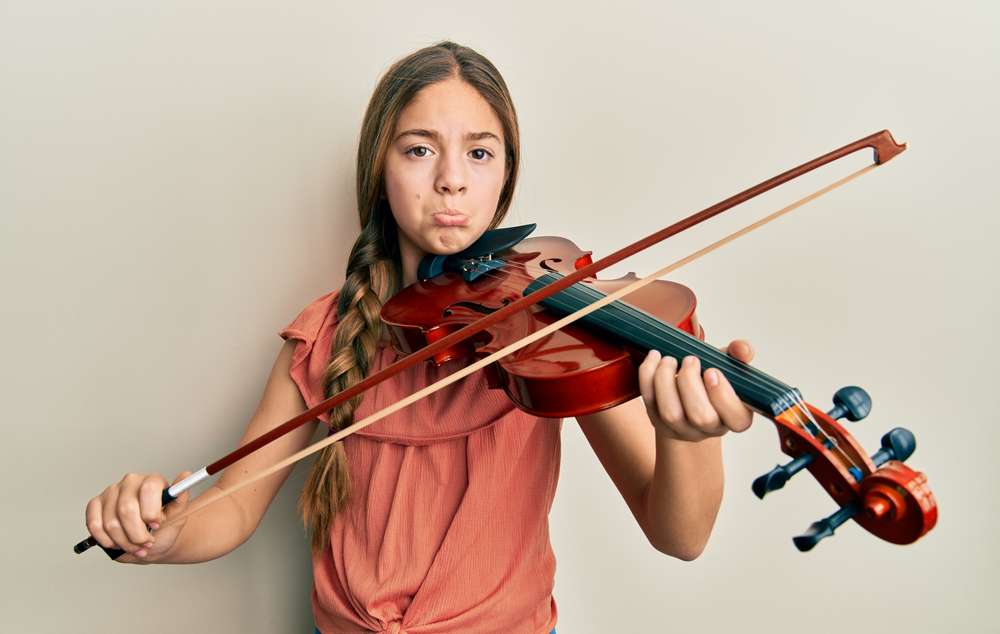
If a child wants to quit music because it’s not fun anymore, it’s time for a serious conversation. Unlike the health concerns, this is not always cause for immediate discontinuation of music lessons. There are a few questions you can ask your child to get to the root of losing their joy in music. These can help you determine the cause of the frustration and give you insight on how to proceed.
Is it too hard?
Even as adults, we can acknowledge that it’s not fun to struggle and be challenged. But if a child has new, more difficult demands in music lessons, they may tell you it isn’t fun anymore and they want to quit. If it truly seems too hard and your child is consistently struggling with mastering new skills, it may warrant a conversation with their teacher about accommodating their struggles to help them achieve success and feel more joy during their lessons.
Is it boring?
Maybe music lessons feel too easy and the teacher is moving too slowly, leaving your child bored. They may not be able to identify boredom and feeling like what they’re learning is too simple, but this can lead to a child wanting to quit almost as much as it being too hard. If this is the case, have a talk with the teacher and see what you can do to offer new challenges and push your child to the next level.
Is the music enjoyable?
If your child isn’t playing songs they enjoy, they’re far less likely to feel joyful when playing and practicing. Playing song after song that they don’t know will feel mundane and boring. While not every song should be their choice of a top song, they should generally enjoy the songs they’re playing and get excited about working on them.
What would make it more fun?
This is a big one. It may be harder for younger kids to pinpoint something specific that would make music lessons more fun, but older kids probably already have a few ideas on how to make music lessons more fun and enjoyable. Maybe they need a new piece of music or an upcoming performance to look forward to. Perhaps they want to transition to group lessons with friends or start learning a second instrument.
Regardless of the reasons, just make sure you’re talking to your child about why they don’t find joy in music anymore before you agree to let them discontinue lessons.
When Children Decide To Put Other Goals First
As your child gets older, he or she may enjoy trying different activities. In addition to music lessons, children may want to try out art classes, baseball, choir, hockey, gymnastics, dance, or more. While they are young, it’s a great idea to let them try out as many activities as you can manage, as it will give them more exposure to different experiences and skills.
When they get into middle school and high school, they may begin narrowing down how they spend their time to just a few activities. This can be about following their passion, sticking with something they’re good at, or being involved in what their friends are doing. This is a natural thing and it’s good for them to play a role in these types of decisions.
At some point, your child will likely have to decide to give up one or more activities in order to focus on something else that they want to prioritize more. This is often a sign of maturity and it should be addressed with understanding.
If your child has been taking piano lessons for her whole life but is now transitioning her time and energy to softball, she may discuss the option of quitting piano lessons. While it’s important to weigh the pros and cons of this, older children often start to think about life after high school and how they want to spend their time, and it’s essential to hear them out and respect their position.
It’s always a good idea to continue to encourage them in their music lessons since they can continue playing into adulthood, but if your child is adamant that their time is better spent on another activity, it’s important to their wellbeing and your relationship that you listen to them and respond with understanding.
Approach Quitting In A Positive Light
If your child is at a place of wanting to discontinue music lessons, you should be their sounding board for working through those thoughts and decisions. While you may be heartbroken about your child wanting to stop playing an instrument, it’s vital that you frame the end of their journey in a positive way. You never want to shame or embarrass your child for making a decision that they feel is best for them, and you want to ensure that they don’t view it as failing or giving up.
Before you finalize the decision to quit, offer some opportunities to change the approach to adapt to their needs. Maybe they are in the high school marching band, taking private music lessons, and performing in the church jazz band. Ask them if scaling back to just one or two of those activities would help. Or maybe they need to take a step back from all of it, but only for a time. Then you can revisit the situation in a few months, most likely with some new insight. Some students step back and miss playing tremendously, while others are at complete peace with the change and feel confident about their decision to discontinue lessons.
Depending on the instrument they play, talk about how stopping music lessons doesn’t equate to not playing the instrument anymore. It may change drastically, but if the instrument is theirs, they can still play it from time to time and may even pick it back up permanently. They may even discover additional opportunities to continue playing their instrument later on that they maybe wouldn’t have found otherwise.
If your child is at a point where they are done playing, do your best to frame it well. Don’t act like they are quitting something essential to life or making a horrible, life-changing decision. Instead, talk about it as if they are moving into the next chapter of their life. Celebrate all that they have learned and accomplished during their time of taking music lessons, and encourage them to continue playing for themselves as they so desire.
Is It A Good Idea To Switch Instruments?

When your child announces that they want to quit playing their instrument, you may feel a rush of many different emotions. One of them may be panic, and you may feel desperate to convince them to stick with it no matter what. You might be willing to agree to things you previously said no to as an attempt at encouraging them to stick with music lessons.
One of those things you might finally consider is switching instruments. Children can be a bit fickle, and they may talk about changing instruments frequently, but you may have never even given it a second thought. However, now that your child is talking about quitting, you may be ready to have the conversation about them selecting a different instrument.
Here are some questions to ask yourself and your child when going down the road of possibly switching instruments:
- Has your child spent enough time with their instrument?
- What is the reason for wanting to switch musical instruments?
- Does your child switch instruments often?
- Is it the music or the instrument that needs to be changed?
- Is the child being challenged enough by their current instrument?
Has Your Child Spent Enough Time With Their Instrument?
The length of time a child has spent playing a particular instrument is one of the best gauges of knowing if it’s time to move on to another one or not. While each child and situation is different, how you, your child, and their music teacher respond to this question can divulge a lot about the decision to begin playing a new instrument.
Ask all involved parties this question, and based on the majority of responses, you can proceed accordingly.
Probably Not
If your child has recently begun lessons with a particular instrument, they may be struggling with some of the fundamentals of that instrument. It’s likely they think that another instrument will be easier, so they bring up switching instruments early on. If this is the case, we highly recommend having them stick with the instrument for a while longer.
Yes, I Think So
If your child has been playing an instrument for several years and has mastered more than the basic fundamentals, it may be time for them to expand their horizons and pick up a new instrument. Some instruments, like guitar and piano, are kind of gateway instruments that lead young musicians to other instruments in the future. They provide baseline skills that will absolutely serve them well in their musical journey, but they are often not the final or only instrument for many musicians.
I’m Not Sure
Perhaps your child is somewhere in the middle between just having started and having played for years. If you’re not certain which side of this they fall on, it’s important to have conversations with your child and their teacher. Maybe a new and challenging skill has just been introduced and the child feels stressed, or perhaps it’s getting boring and mundane because they aren’t being challenged enough. If this is the case, communication between all parties will be necessary to determine the next steps.
What Is The Reason For Switching Musical Instruments?
If your child has brought up switching instruments, your initial response was almost certainly “Why?” Their answer to this question is vital to the decision-making process and should be taken into account when moving forward.
You need to get to the heart of the issue and understand the purpose behind their desire to switch instruments. Here are some of the most common reasons kids say they want to switch instruments.
They’re Bored
Playing an instrument for an extended period of time can get boring for some children. They may be tired of the music or may feel like the instrument isn’t challenging enough for them anymore. They may need some more difficult songs to make it more fun, but this is also a very legitimate reason for wanting to switch instruments.
It’s Hard
If you discover that a child wants to switch instruments because their current one seems too hard, it’s most likely just about getting over a learning curve. Maybe a new technique or skill was recently introduced and they’re not enjoying struggling with it. At the same time, if your child dove head-first into a challenging instrument, they may be a little bit overwhelmed for good reason. Consider talking to their teacher about adjusting their approach or finding some ways to help them work through this difficult season.
The Teacher
We don’t like to point fingers at teachers as a cause for concern because the majority of music teachers are fantastic in every way. However, sometimes a child doesn’t mesh well with a teacher or the teacher’s approach isn’t suited well to the child’s learning style. Sometimes changing teachers within the current instrument is an acceptable solution to this concern, but other times children feel strongly about switching instruments and teachers, and that alone can reinvigorate their passion for music.
Does Your Child Switch Instruments Often?
If your child has switched instruments multiple times in a short time period, you may need to ask yourself why. It could be a commitment issue, it could be about not wanting to work through hard things, or it could be about getting bored easily. But if your child has asked–yet again–to move to a different instrument, we would recommend not letting them just yet.
It warrants a conversation about why they consistently ask to change instruments. They may not have a specific reason, but you may be able to ask some questions about it that help you get to the core of the issue.
When a child switches instruments before they get a chance to really master the fundamentals of an instrument, it does them a great disservice. Learning to play any instrument has a sort of “honeymoon phase,” which is later followed by a learning curve where students really have to fight through to get to the next level of mastery. If a student knows this, understands it, and can acknowledge it, it’s worth a conversation about switching. But if they’re not convinced there is a “fight through it” phase, it’s probably best to let them continue working on their current instrument.
You also need to ask yourself if this current request to switch instruments is like the other times or if it’s different. Perhaps your child has asked to switch instruments previously because they were bored or didn’t like working through hard skills. But maybe this time, they’re asking because they saw a concert with a particular instrument that really piqued their interest. If that’s the case, allowing them to switch might just mean they get a chance to discover their lifelong favorite instrument.
Is It The Music Or The Instrument That Needs To Be Changed?
We can’t emphasize enough how important music is for kids’ music lessons. What a child is playing and practicing can make or break their entire perspective and experience when it comes to learning an instrument.
Yes, there will be a time when they will do simple warm-ups or more classic pieces to work on particular skills. But professional musicians have adapted popular pieces to fit varying skill levels on many instruments for good reason–because people want to play them.
Of course, your young beginner pianist may not be playing the exact composition of their favorite song from a popular movie, but it will be similar enough to keep them motivated. When kids can play their songs for friends and family and have others recognize it, that can be a huge boost in their confidence and their interest in the instrument.
Playing fun songs can be excellent motivation for musicians of all ages, and when an instrument feels boring and tired for someone, switching out the music is often a fantastic solution.
If you go this route and switch up the music your child is playing and they still ask about switching instruments, then it might actually be about the actual instrument. Before you agree to letting them pick a new instrument, ask them what type of music they want to play. Regardless of what instrument they choose, having an idea of the music they enjoy will help them stay interested and motivated in the future.
Are Kids Being Challenged Enough By Their Current Instrument?
When a child is citing boredom as their reason for wanting to change instruments, you might wonder about how much they’re being challenged by their current instrument.
Remember that playing an instrument is a lifelong journey of learning, and in most cases, a musician has never fully “arrived” at the finish line. They can constantly learn more and improve their musical abilities, so it’s not really possible (in most cases) for the instrument itself to be too easy or not challenging enough.
So if a child feels like their instrument or music lessons aren’t challenging enough, we need to look to the music itself, the lessons, and the teaching approach.
The music should consistently get more challenging the longer your child plays the instrument. They should integrate more complicated time signatures, more intensive note patterns, and more elaborate songs. This should be the first place to start if you suspect a lack of challenge is the main reason behind your child’s desire to switch instruments.
The lessons, just like the music, should build in difficulty as your child goes along. They should be fun and engaging, but they should also challenge your child and take them a bit out of their comfort zone. The lessons should introduce new skills that may require your child to ask questions or request a demonstration, which involves them engaging more actively in their learning.
Finally, the teaching approach and personal practice time can be taken to a new level. The goal isn’t to make it hard, but rather to get your child more fully invested in accomplishing new goals and expanding their skills.
Next Step: Supporting Your Child Towards A Future With Music
Supporting your child in their early musical days is invaluable. Your positive support, constant encouragement, and loving cheerleading are sure to stick with them for life. Not all children choose to carry on music lessons beyond their schooling years, but others know early on in life that they want to have a long future with music.
A future in music can look different for different people, but having family members offer support is a vital part of a promising musical future for anyone. Setting your child up for success in their musical endeavors starts with you, and we would love to come along for the journey. Contact Lessons in Your Home to set up your child’s private music lessons and kickstart their journey toward musical success.
